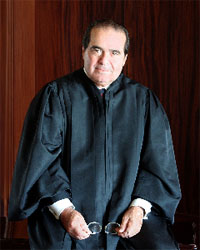Scalia: The reasonable and the absurd. Part 1: A tiny call for recusal despite a widespread presumption of bias
There was a tiny outcry in December for U.S. Supreme Court Justice Antonin Scalia to recuse himself from deliberating on the two marriage-related cases before the high court this session. It erupted mostly from liberal political bloggers after Associated Press and some other media reported that Scalia, in a December 10 book tour appearance at Princeton University, discussed past dissents in which he compared homosexuality with such harmful acts as murder, incest, adultery, and cruelty to animals.
Legal experts were quick to shoot down the idea that Scalia should recuse himself. Former Republican Solicitor General Charles Fried said, “Judges all the time say, ‘I’m against X because X would mean Y.’” And while statements made in public “might be a different story,” he said, Scalia’s remarks at Princeton were no different than his remarks in his written judicial opinions.
On the other side, Jonathan Turley, a constitutional law expert at Georgetown University, told MSNBC that most judges avoid making public comments related to pending cases. He said he found it “very troubling” that Scalia’s comments at Princeton could be seen as addressing “one of the core issues” in two cases coming up this spring related to marriage rights for same-sex couples.
“Scalia has a history of making comments that many of us find very difficult to square with judicial codes of conduct,” said Turley.
The judicial code of conduct is United States Code Title 28, Section 455. Paragraph (a) states that a judge or justice shall disqualify himself “in any proceeding in which his impartiality might reasonably be questioned.”
The U.S. Code also notes, in subparagraph (1) of Paragraph (b) that a justice or judge shall disqualify himself “where he has a personal bias or prejudice concerning a party….”
Scalia recused himself in 2004 from the Pledge of Allegiance case Elk Grove v. Newdow. He did not explain why, but some speculated it was because he had stated publicly that one party’s claim was “meritless.”
The Supreme Court public information office does not keep statistics regarding the justices’ recusals, but it appears Scalia has not made a practice of recusing himself from many cases, even when the clamor for recusal is very loud and widespread, as it was in 2004 over an entirely different case—one involving a friend.
At that time, the court was about to rule on a matter concerning then Vice President Dick Cheney’s private dealings with an energy task force. Scalia, who was close enough friends with Cheney to invite the vice president to join him on a hunting trip, did not recuse himself.
Responding to queries from two U.S. senators asking about recusal, then Chief Justice William Rehnquist said, “There is no formal procedure for court review of the decision of a justice in an individual case. That is so because it has long been settled that each justice must decide such a question for himself.”
In a memorandum responding to the outcry for his recusal, Scalia said he would recuse himself “when, on the basis of established principles and practices, I have said or done something which requires that course.”
“My recusal is required if, by reasons of the actions described above, my ‘impartiality might reasonably be questioned’,” wrote Scalia, quoting the U.S. Code. He did not recuse himself from the Cheney case. He joined a 7 to 2 majority ruling that Cheney did not have to turn over certain documents related to his private meetings with the energy officials.
Might Scalia’s impartiality on legal matters involving gay people be reasonably questioned? Nearly every legal expert consulted for this report said yes. And not a single one said they believed Scalia would recuse himself from the two upcoming marriage cases.
U.S. Rep. Barney Frank, who three years ago publicly labeled Scalia a “homophobe,” said December 18 he still thinks Scalia is a “bigot and a homophobe” but doesn’t think Scalia should recuse himself from the marriage cases.
“You don’t recuse yourself because you feel strongly about something,” said Frank. If that were the case, he said, U.S. District Court Judge Vaughn Walker, who is gay and has a same-sex partner, should have recused himself from hearing the Proposition 8 case in California. (Frank added that he takes the U.S. Code to mean judges should recuse themselves only when they might be “affected financially” by a case.)
Still, there is a widespread presumption that Scalia’s willingness –in his judicial opinions and his public remarks— to compare intimate relations between two people of the same gender with murder has cemented his vote against the legal rights of gay people under the Constitution even before the briefs have been filed.
Scalia has always voted against the interests of gay people in cases before the court –from the 1987 decision, 5 to 4, allowing the U.S. Olympic Committee to ban Gay Games from calling itself the Gay Olympics, through the unanimous decision in 1995 to allow St. Patrick’s Day parade organizers in Boston to exclude a gay contingent, and the 5 to 4 decision in 2000 to allow the Boy Scouts of America to revoke the membership of an Eagle Scout because he was gay.
It wasn’t until the court began recognizing the legal rights of gay people that the depth of Scalia’s discomfort with things gay became apparent.



Well, I agree but wait a minute. He has already stated on the record in oral arguments in Lawrence that if Bowers was overturned then Lawrence could not be reconciled with denial of marriage equality. Does he therefore not have a duty to respect stare decisis?
Oops but there is the problem isn’t is: the oxymoron of juxtaposing Scalia and judicial ethics